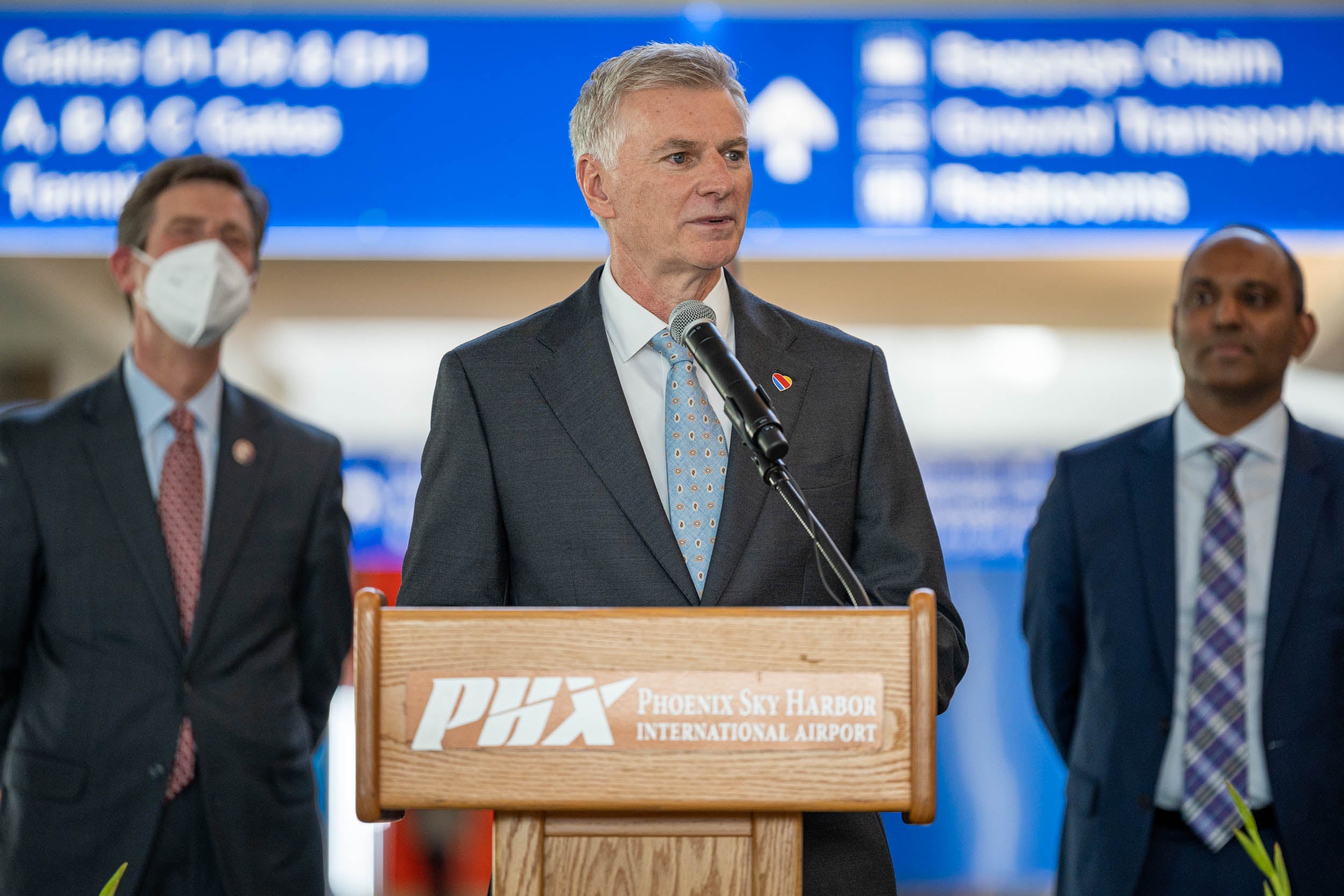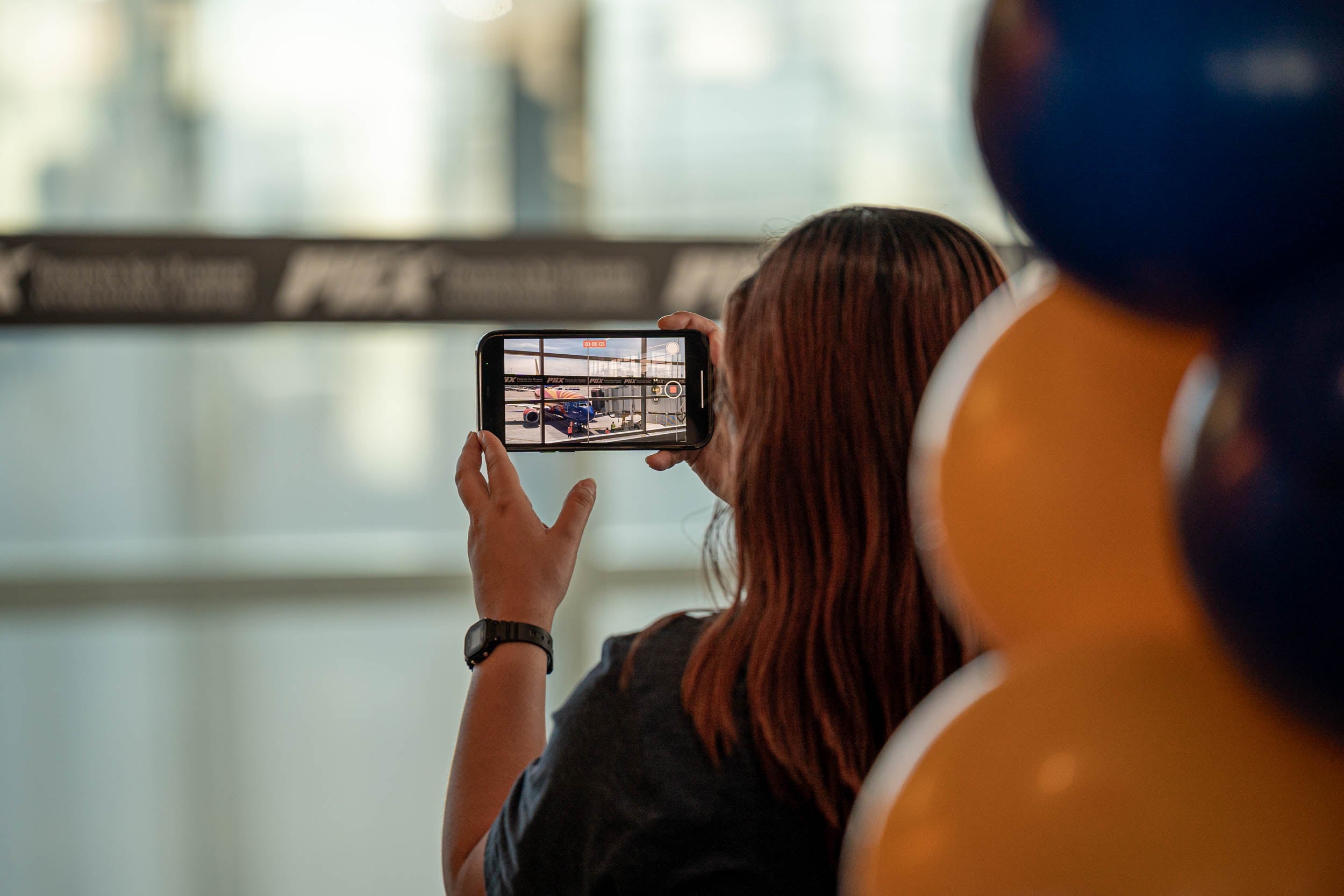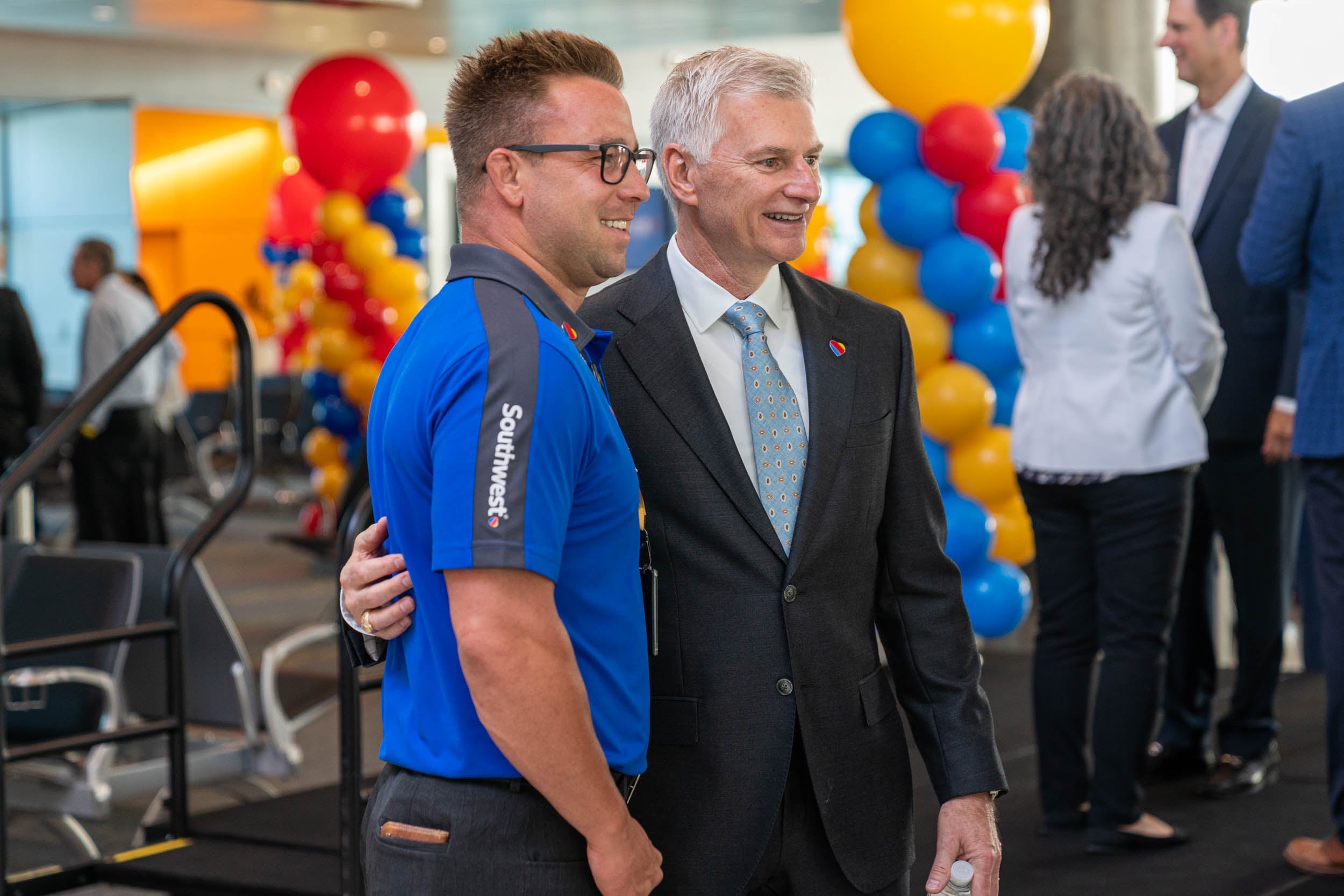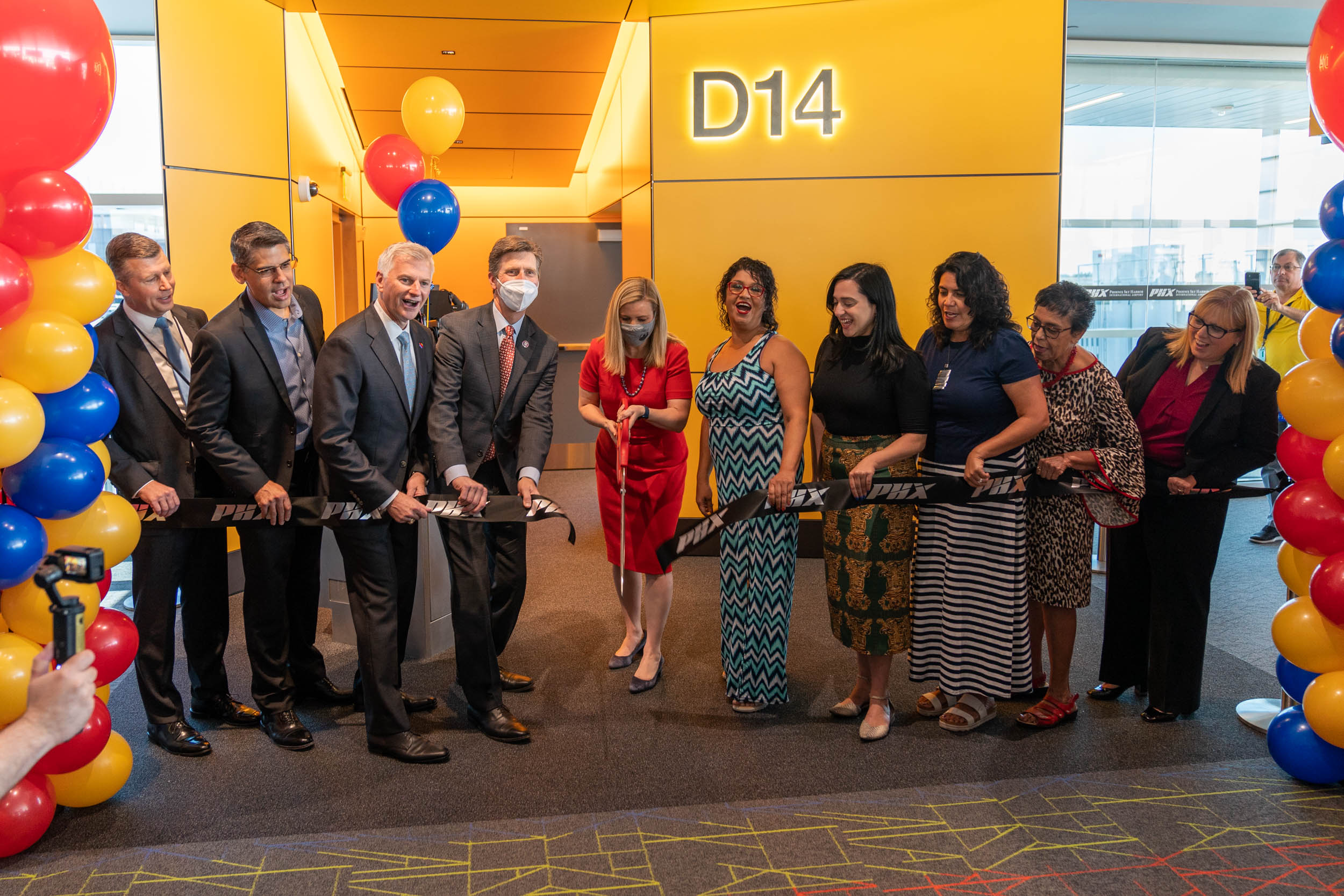Southwest CEO says airline is ready for summer travel, even as pilots protest
It's been a challenging start of summer for the airline industry, highlighted late last week when thousands of flights were canceled, diverted or delayed.
U.S. airlines have been caught back-footed since last summer, as travel demand came rushing back and airlines scrambled to meet the newly returned demand.
With summer demand surging and staffing shortages still affecting the airline industry, travelers are worried about summer meltdowns. And perhaps with good reason, following a Memorial Day weekend kerfuffle and then last week's delays doing little to inspire confidence.
Bob Jordan took the reins as CEO of Southwest in the middle of the turbulence. His appointment to the role was announced last summer.
In October, early in his transition into the role — which became effective in February — Southwest experienced its own operational meltdown that left more than 1,800 flights canceled, which Jordan worked to manage along with then-CEO Gary Kelly (Jordan has been with Southwest in various roles since 1988, including most recently as executive vice president of corporate services).

TPG had the chance to interview Jordan last week in Phoenix, where Southwest cut the ribbon on eight new gates. He admitted that the airline has made missteps as recently as this spring, overcommitting limited resources and failing to ensure that the airline could keep up with demand. However, Jordan insisted that Southwest is better prepared to tackle the summer.
"Last year, I'll fully admit that we scheduled — we got into the summer, we realized that we needed to hire," Jordan said, noting that it "was too late for [last] summer."
"It hurt our customers," he added. "It hurt our pilots, it hurt our crews and our ground ops folks."
The process of hiring, Jordan said, has put Southwest in a better staffing situation than last year.

"We've hired 14,000 people since then," he said. "Of that, 20% are [flight] crews, 20% are ground operations and 10% are in our call centers."
Jordan declined to specify how many of the new hires are pilots.

Pilot recruitment and retention have been a difficult issue for all U.S. airlines, including Southwest.
Pilots at the airline have expressed frustration over irregular operations during the past year with complaints of logistical hardships during reroutings and impacts on their personal lives. The pilot's union, the Southwest Airlines Pilots Association (SWAPA), has been increasingly vocal with complaints as it moves to push for a new contract. On Tuesday, SWAPA pilots picketed outside Dallas Love Field (DAL).
A nationwide pilot shortage, which had been simmering for years, was accelerated by early retirements during the early days of the pandemic. The shortage has primarily affected regional airlines and the smaller cities they serve, with mainline carriers hiring pilots in droves. Even so, smaller and budget airlines like JetBlue and Spirit, and more domestic-focused airlines like Southwest have also had a harder time than normal adequately filling their pilot ranks.
For instance, Southwest is flying about 30 fewer airplanes each day than it would like due to the pilot shortage, Jordan said, noting that the "constraint is primary pilots to fly all the aircraft."
The union, meanwhile, insists that a new contract is essential to sustainably boosting the pilot ranks.
"[Southwest] needs an industry-leading [collective bargaining agreement] to recruit and retain pilots during the shortage — that means career earnings, disability/benefits and quality of life gains," Amy Robinson, a spokesperson for SWAPA, told TPG by email.
"[Southwest] needs SWAPA's inputs that are currently in the [collective bargaining agreement] rewrite to stabilize the operation and make things more efficient."

Despite the union's gripes, Jordan emphasized that the airline, like the union, wants a new contract to be wrapped up.
"Contract negotiations are hard," Jordan said. "We want certainty, we want contracts for our people. I can promise you from me on down, there's no tactic to stall, to go slow, or anything like that."
"We're all the company and we're all our people," he added.
In one of the nastier moments of the spat, SWAPA recently quoted an opportunistic tweet by the airline, accusing it of overscheduling flights that it did not have the staff to operate.
Jordan objected, however, and argued that while an overambitious schedule last year may have inhibited the airline's ability to recover from weather delays, the airline had pared this summer's schedule back enough to add a comfortable buffer.
"The second quarter schedule is 7% below 2019, and in April we reduced it from what was published by five or six points," he said. "We've got more buffer to deal with trend changes we've seen, like higher sick time."
Higher rates of sick call-outs have plagued airlines since the first Omicron wave began in December, linked to both continuing surges of COVID and pandemic-related burnout among workers. Jordan said that Southwest routinely sees 3% to 4% more sick call-outs than the airline has seen in previous years.
Jordan pointed to the airline's performance during the Memorial Day Weekend travel period as evidence that the airline is in better shape to manage disruptions.
Over the holiday travel period, from Thursday, May 26, to Tuesday, May 31, Southwest canceled 123 out of 21,408 scheduled flights — 1% of the schedule — and delayed 4,134, or 19% of the schedule, according to data from FlightAware. On its worst individual day, the airline canceled 86 flights (2%) and delayed 1,118 (30%).
For comparison, American canceled 289 mainline flights (2%) and delayed 3,658 (21%) during the same period; United canceled 186 (1%) and delayed 3,216 (24%); Delta canceled 875 (5%) and delayed 3,126 (19%).
Those numbers do not include flights operated by regional airlines, which performed slightly worse, according to FlightAware.
The fact that cancellations were relatively contained is seen by Jordan as a win.
"We actually had really good operational performance," he said, though he acknowledged some delays. "We flew a little bit later, but our A30 — on-time within 30 minutes — was actually really good."

"If you look at our cancel rate in May and June, and on Memorial Day, it was half of what it was in March and April," he added. Jordan also noted that over the weekend of June 10-12, which saw air traffic control issues in the Florida region — something that has typically stymied Southwest — the airline was also able to keep its rate of cancellations under 2%.
"What's happening [during disruptions] is we're running the airline a little later, but our A30 is really good, and we're getting you there," Jordan said. "Our completion rate is really high, which is not what was happening in the summer of 2021."
Jordan also argued that the airline invested in its crew scheduling department to help better manage resources during irregular operations. This was an effort to avoid the kind of episode last October where it took the airline more than three days to reposition pilots and flight attendants after thunderstorms and air traffic control issues in Florida forced the airline to cancel thousands of flights.
Even so, Jordan said, the real test of whether all of this will be enough is coming up soon.
"The next test, of course, is the Fourth of July weekend," he said. "That'll be a big test for everybody."
"We feel really good, but I think that's the next test for all of us," he added.
TPG featured card
at Capital One's secure site
Terms & restrictions apply. See rates & fees.
| 5X miles | Earn 5X miles on hotels, vacation rentals and rental cars booked through Capital One Travel |
| 2X miles | Earn unlimited 2X miles on every purchase, every day |
Pros
- Stellar welcome offer of 75,000 miles after spending $4,000 on purchases in the first three months from account opening. Plus, a $250 Capital One Travel credit to use in your first cardholder year upon account opening.
- You'll earn 2 miles per dollar on every purchase, which means you won't have to worry about memorizing bonus categories
- Rewards are versatile and can be redeemed for a statement credit or transferred to Capital One’s transfer partners
Cons
- Highest bonus-earning categories only on travel booked via Capital One Travel
- LIMITED-TIME OFFER: Enjoy $250 to use on Capital One Travel in your first cardholder year, plus earn 75,000 bonus miles once you spend $4,000 on purchases within the first 3 months from account opening - that’s equal to $1,000 in travel
- Earn unlimited 2X miles on every purchase, every day
- Earn 5X miles on hotels, vacation rentals and rental cars booked through Capital One Travel
- Miles won't expire for the life of the account and there's no limit to how many you can earn
- Receive up to a $120 credit for Global Entry or TSA PreCheck®
- Use your miles to get reimbursed for any travel purchase—or redeem by booking a trip through Capital One Travel
- Enjoy a $50 experience credit and other premium benefits with every hotel and vacation rental booked from the Lifestyle Collection
- Transfer your miles to your choice of 15+ travel loyalty programs
- Top rated mobile app


